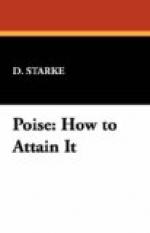It seems to them a thousand times easier to say: “These minds are too gross to comprehend mine,” than to seek for a means of establishing an understanding with those whom they tax with ignorance and insensibility.
They might, perhaps, be convinced of the utility to them of divulging their feelings, could they be forced into a position where they had to defend their ideas or were compelled to put up a fight on behalf of their convictions.
In the ranks of the enemies of poise sullenness most certainly finds a place.
It is the fault of the feeble-spirited who have not the energy to affirm their sentiments or to make a plain statement of their convictions that they become incensed with those who oppose them.
In their case a good deal of false pride is present. They know themselves to be beaten and to be incapable of fighting, yet they are too vain to accept defeat. They refuse the sympathy that wounds them, and suffer the more from their inability to yield themselves to that good-will which would aid and comfort them.
From this mental conflict is born an irritation that manifests itself in the form of obstinate sullenness.
In other cases the same state of mind may produce radically different results.
Always obsessed by the fear of appearing ridiculous and by the no less vivid dread of seeming to be an object of sympathy, such people are often driven through lack of poise into extreme boastfulness.
No man who has poise will ever fall a victim to this misfortune.
He knows exactly what his capabilities are and he has no need to exaggerate his own abilities to impress his friends.
Poise calls for action, when this becomes necessary; but the man of resolve, being always prepared to do what is needful, considers mere boasting and bravado as something quite unworthy of him.
There are, however, certain extenuating circumstances in the cases of those timid people who take refuge in boasting. They are almost invariably the dupes of their own fancies, and for the moment really believe themselves to be capable of endeavors beset by difficulties, of the surmounting of which they understand nothing.
Nothing looks easier to duplicate than certain movements which are performed with apparent ease by experts.
Which of us has not been profoundly astonished at the enormous difficulty experienced in accomplishing some simple act of manual toil that we see performed without the least effort by a workman trained to this particular task?
What looks easier, for instance, than to plane a piece of wood or to dig up the ground?
Is it possible that the laborer, wheeling a barrow, really has to be possest of skill or strength?
It hardly seems so. And yet the man who takes a plane in his hands for the first time will be astounded at the difficulty he experiences in approximating to the regularity and lightness of stroke that comes naturally to the carpenter.




